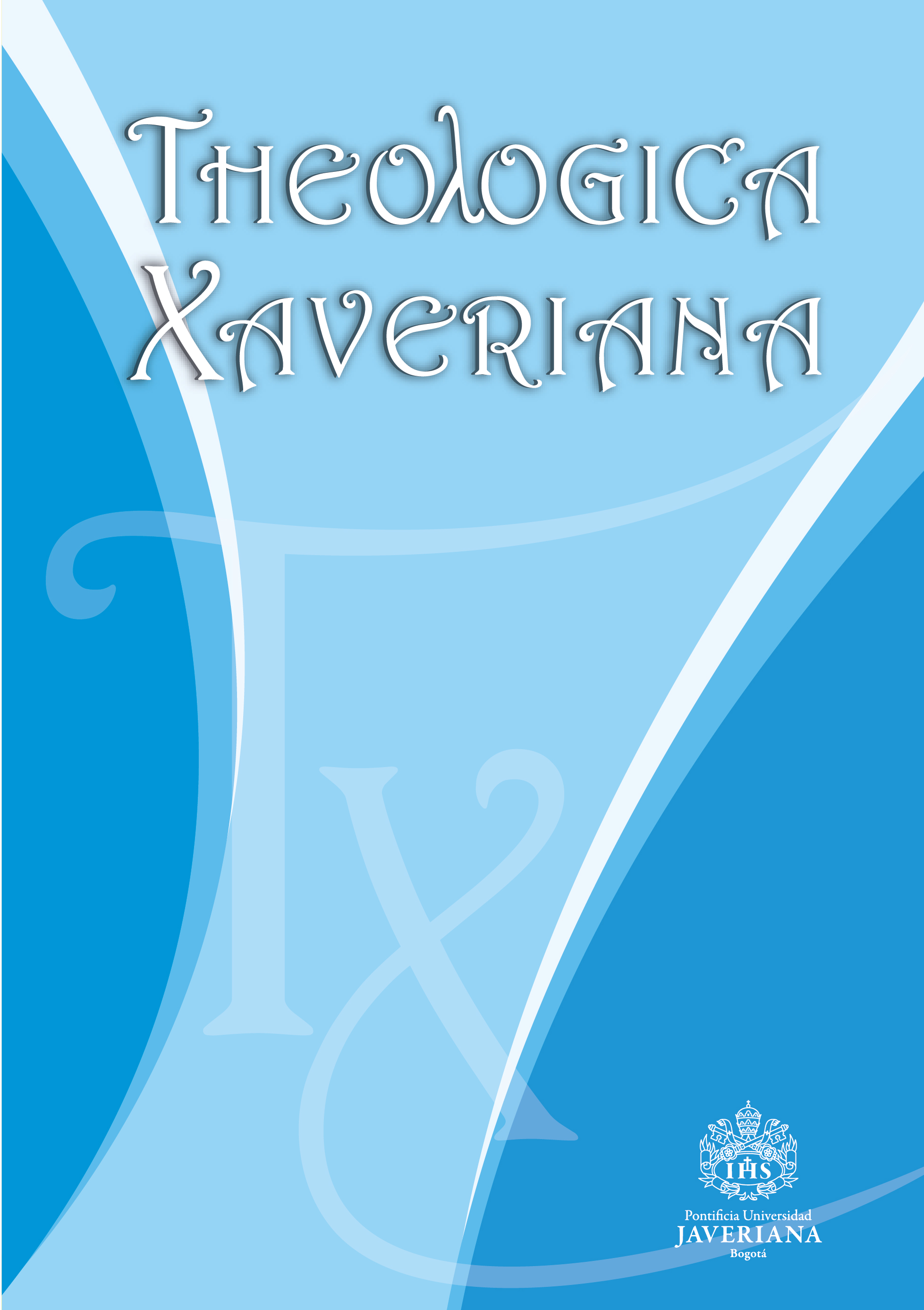Abstract
Xavier Zubiri’s realist philosophy revealed a path of liberation from “concipient intelligence,” in which conceiving and judging were the proper act of intellection and not apprehending reality. This type of knowledge, since the time of the ancient Greeks, separated sensing and discerning as two different and even opposite faculties. On the contrary, “sentient intelligence” is a unique act of intellection in which sensing and discerning are both key moments, in which the primary and radical activity of intellection is apprehending “reality” rather than concepts. The recuperation of the catechumenate of the Rite of Christian Initiation of Adults, by the Second Vatican Council, is an excellent demonstration of “sentient intelligence” in the service of faith.
Biemer, Günter. “Catequese.” In Dicionário de conceitos fundamentais de teologia, organized by Peter Eicher, 69-75. São Paulo: Paulus, 1993.
Borobio, Dionísio. História e teologia comparada dos sacramentos: O princípio da analogia sacramental. São Paulo: Loyola, 2017.
Borrielo, Luigi. “Experiência mística.” In Diccionario de mística, dirigido por L. Borrielo, E. Caruana y M. del Genio, 339-410. São Paulo: Loyola-Paulus, 2003.
Caponigri, A. Robert. “A propósito de sobre a essência: o realismo de Xavier Zubiri.” In Introdução ao pensamento de Zubiri (1898-1983). Por uma filosofia da realidade, organized by Philibert Secretan, 47-64. São Paulo: É Realizações Editora, 2014.
Castro Martínez, Gabriel. “Kerigma.” In Diccionario de pastoral y evangelización, directed by Vicente M. Pedrosa, Jesús Sastre and Raúl Berzosa, 625-631. Burgos: Monte Carmelo, 2001.
Congregação para o Culto Divino e a Disciplina dos Sacramentos. Missal romano. Restaurado por decreto do Concílio Vaticano II e promulgado pela autoridade do papa Paulo VI (15.ª ed.). São Paulo: Paulus, 2011.
Costa, Valeriano dos Santos. “Inteligência senciente e liturgia.” Revista de cultura teológica 90 (2017): 209-233.
Costa, Valeriano dos Santos, and Messias de Morais Ferreira. O sínodo arquidiocesano de São Paulo: o desafio da evangelização esta cidade. São Paulo: Editora Educ, 2018.
Ellacuria, Ignacio. “Uma abordagem da filosofia de Zubiri.” In Introdução ao pensamento de Zubiri (1898-1983). Por uma filosofia da realidade, organized by Philibert Secretan, 33-46. São Paulo: É Realizações Editora, 2014.
Fernández Tejada, José. “Prefácio.” Zubiri, Xavier. Inteligência e logos. São Paulo: É Realizações, 2011.
Ferraz-Fayos, “A trilogia sobre a inteligência.” In Introdução ao pensamento de Zubiri (1898-1983). Por uma filosofia da realidade, organized by Philibert Secretan, 65-76. São Paulo: É Realizações Editora, 2014.
Francisco. Evangelii gaudium: sobre o anúncio do Evangelho no mundo atual. Brasília: CNBB, 2013.
Hipólito de Roma. Tradição apostólica de Hipólito de Roma. Liturgia e catequese no século III. Petrópolis: Vozes, 2004.
Ibáñez, José Antonio Abad. “Iniciación cristiana.” In Diccionario de pastoral y evangelización, directed by Vicente M. Pedrosa, Jesús Sastre and Raúl Berzosa, 559-573. Burgos: Monte Carmelo, 2001.
Lópes Sáez, Jesús. “Catecumenato e inspiração catecumenal.” In Dicionário de catequese, organized by M. Navarro and V. M. Pedrosa, 124-133. São Paulo: Paulus, 2004.
López Martín, Julián. La liturgia de la Iglesia. Teología, historia, espiritualidad y pastoral. Madrid: Biblioteca de Autores Cristianos, 1996.
Millás Vendrell, José María. “Zubiri y los sacramentos.” Gregorianum 82 (2001): 229-323.
Pianna, Gennino. “Iniciação cristã.” In Dicionário de teologia moral, by Francesco Compagnoni, Giovanni Piana, and Salvatore Privitera, 627-635. São Paulo: Paulus, 1990.
Pintor-Ramos, Antonio. “Uma filosofia da religião cristã.” In Introdução ao pensamento de Zubiri (1898-1983). Por uma filosofia da realidade, organized by Philibert Secretan, 77-108. São Paulo: É Realizações Editora, 2014.
Quelquejeu, Bernard and Jean-Pierre Jossua. “Experiência.” In Dicionário de conceitos fundamentais de teologia, organized by Peter Eicher, 298-303. São Paulo: Paulus, 1993.
Sacra Congregatio Pro Cultu Divino. Rituale romanun. Ordo baptismi parvulorum. Editio typica altera, 1973.
Sagrada Congregação para o Culto Divino. Ritual de batismo de crianças. São Paulo: Paulus, 1999.
Seckler, Max, and Christoph Berthold. “Fé.” In Dicionário de conceitos fundamentais de teologia, organized by Peter Eicher, 298, 304-312. São Paulo: Paulus, 1993.
Taborda, Francisco. “Crisma sacramento do Espirito Santo? Para uma identificação da crisma a partir de sua unidade com o batismo.” Perspectiva teológica 30 (1998): 183-209.
_____. Nas fontes da vida cristã: uma teologia do batismo-crisma. São Paulo: Loyola, 2001.
Teixeira, João Antônio Pinheiro. A finitude do infinito: o itinerário teologal do homem em Xavier Zubiri. Lisboa: Universidade Católica, 2007.
Torrel, Jean-Pierre. Iniciação a Santo Tomás de Aquino: sua pessoa e sua obra. (4.ª ed.). São Paulo: Loyola, 2015.
Zubiri, Xavier. Estructura dinámica de la realidad. Madrid: Alianza Editorial, 1989.
_____. Inteligência e logos. São Paulo: É Realizações Editora, 2011.
_____. Inteligência e razão. São Paulo: É Realizações Editora, 2011.
_____. Inteligência e realidade. São Paulo: É Realizações Editora, 2011.
_____. Sobre el hombre. Madrid: Alianza Editoria
This journal is registered under a Creative Commons Attribution 4.0 International Public License. Thus, this work may be reproduced, distributed, and publicly shared in digital format, as long as the names of the authors and Pontificia Universidad Javeriana are acknowledged. Others are allowed to quote, adapt, transform, auto-archive, republish, and create based on this material, for any purpose (even commercial ones), provided the authorship is duly acknowledged, a link to the original work is provided, and it is specified if changes have been made. Pontificia Universidad Javeriana does not hold the rights of published works and the authors are solely responsible for the contents of their works; they keep the moral, intellectual, privacy, and publicity rights.
Approving the intervention of the work (review, copy-editing, translation, layout) and the following outreach, are granted through an use license and not through an assignment of rights. This means the journal and Pontificia Universidad Javeriana cannot be held responsible for any ethical malpractice by the authors. As a consequence of the protection granted by the use license, the journal is not required to publish recantations or modify information already published, unless the errata stems from the editorial management process. Publishing contents in this journal does not generate royalties for contributors.



